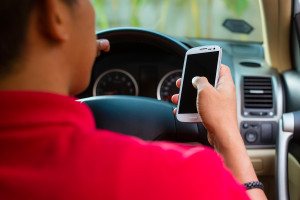

 We’ve all seen individuals texting while driving. But the different types of risks people take with their smartphones while on the road are more widespread than some people realize.
We’ve all seen individuals texting while driving. But the different types of risks people take with their smartphones while on the road are more widespread than some people realize.
A new AT&T survey reveals that drivers also surf the web, tweet, take selfies and even video chat while behind the wheel. Some even shoot videos, the telecommunications giant found.
The survey, commissioned by AT&T and conducted by Braun Research, polled 2,067 people in the U.S. ages 16 to 65 who use their smartphone and rive at least once per day.
Among the findings:
AT&T said it conducted the survey to help boost driver awareness about the dangers of smartphone use behind the wheel. It has already pursued this message through its “It Can Wait” campaign, which focused initially on the dangers of texting while driving. Now, AT&T plans to expand its public serve campaign to address other driving distraction issues that emerged from its survey. The effort will include collaborations with social platforms, as well as a nationwide “virtual reality” tour over the summer.
“When we launched “It Can Wait”five years ago, we pleaded with people to realize that no text is worth a life,” AT&T global marketing officer Lori Lee said in prepared remarks. “The same applies to other smartphone activities that people are doing while driving.”
A major insurance industry group reacted favorably to the AT&T survey and resulting public education plans.
“We applaud the AT&T expansion of the “It Can Wait” campaign,” Loretta Worters, vice president of the Insurance Information Institute, told Carrier Management via email. “Activities that take drivers’ attention off the road, including talking or texting on mobile devices, tapping into social media and other distractions, are a major safety threat.
She noted some statistics that bear out the risks, such as the deaths of 3,154 people in the United States in 2013 from distraction-related crashes (based on National Highway Traffic Safety Administration criteria).
“People can become so absorbed in their conversations and other uses that their ability to concentrate on the act of driving is severely impaired,” she said. “That’s why it is important to get laws on the books throughout the country to penalize those who use their smart phones while driving.”
In 2012, a Consumer Reports survey determined that 71 percent of respondents cut back on texting, talking on a handheld phone or using a smartphone while driving in the previous year. More than half said they did so because of state laws, and that’s up from 44 percent in a survey conducted in 2011, Worters said.
[ijtv id=”12216″]